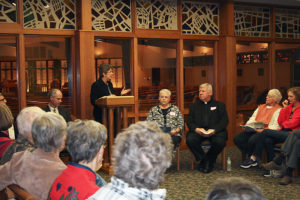By Barb Arland-Fye
The Catholic Messenger
BETTENDORF — Dorothy Vrba lay in a hospital bed in DeWitt facing the end of her life at age 91. She had an inoperable bowel obstruction and had to decide what ordinary/extraordinary measures she was willing to take to preserve her life.

A panel discussion on end-of-life issues was held Nov. 12 in the Mary Chapel at St. John Vianney Parish in Bettendorf.
“We laid out the options for mom,” Father Jim Vrba told an audience of about 100 during a Nov. 12 panel discussion on end-of-life issues at St. John Vianney Church, Bettendorf. “Mom, what do you want to do?” her family asked. Fr. Vrba says his mother’s response in August 2009 is etched in his brain. She said: “I thought about it and I prayed about it. Let nature take its course. Keep me comfortable. I love you all and we’ll all be together some day.”
“She had a better degree in theology than I did,” said the priest, pastor of St. John Vianney and one of four panelists participating in the discussion titled “The Difficult Conversation.” But Fr. Vrba admitted it was tough to watch his mother slowly die, having decided to withhold food because it provided no nutritional value and would have actually been harmful due to the bowel obstruction.
The discussion’s subtitle, “When all is said and done how do we talk about the end of life with those we love?” provided the impetus for heartfelt discussion and also addressed moral and ethical implications.
Panelist Cindy Flanders-Brown, a member of the parish’s Health Cabinet, got choked up sharing her experience of journeying with her parents at the end of their lives. Her mom went into the hospital for gall bladder surgery and was diagnosed with cancer. She died just days later in 2005. Flanders-Brown still wonders what she could have done differently to help her mother through those difficult final days. Her father died in October 2014 and was on oxygen for the last four months of his life. “He wanted autonomy and I wanted safety and security. That’s why we were always butting heads,” Flanders-Brown said she finally realized.
Based on her experiences, she advised the audience: prepare written directives for the next generation, keep financial information in a consistent place, and talk about what you want. If time becomes short, what’s most important to you? Is it eating chocolate ice cream? Whatever it is, your loved ones want you to have a good life up until the end, she said with a catch in her throat.
“How can we talk to and listen better to those we love?” Chris McCormick Pries, also a member of St. John Vianney’s Health Cabinet, asked Chaplain Marlin Whitmer of Trinity Episcopal Church, Davenport.
Whitmer explained that active listening is essential. Flanders-Brown did that. “She was listening actively; he (her father) didn’t want to talk about it,” the chaplain observed. She said her dad was angry with God and became estranged from the church. But she learned through a visiting nurse that her father had been receiving Communion daily for the last four months of his life. He just didn’t tell his daughter.
The chaplain observed that many times people become angry because of their pain — not so much the physical pain as the emotional and spiritual pain. Fr. Vrba said that’s why anointing of the sick is such a beautiful sacrament. “To be able to bring that sense of healing, of prayer and of touch, of anointing, of laying on of hands…” As he’s administered the sacrament, he’s had families lay hands on their dying family member. He hopes that individual feels the touch and hears the prayers and that when everyone present says “Amen,” they hear “Ah,” from their loved one. “A happy dying,” the priest said.
Dr. Steve Sorensen, M.D., the fourth panelist, talked about how hospice and palliative care can give patients quality time for the time they have left. Hospice is for those who have approximately six months left to live, while palliative care is for people living with serious, chronic illness.
As a specialist in hospice and palliative care, his most important skill is listening to his patients. The challenge with the medical system, he said is that “it’s set up not to comfort, but to cure.” He thinks many physicians are afraid their patients will think their doctors are giving up on them. McCormick Pries, a nurse practitioner, noted that hospice and palliative care have been shown to improve and lengthen people’s lives.
One audience member asked how to deal with contentious families, when each member thinks he or she knows what’s best for their loved one. Sorensen said he tells families that he is responsible for doing what is right by the patient, not by the family members. Everyone ought to have an ongoing conversation with their loved ones about what they desire at the end of their lives, the panelists said. Sorensen recommends designating a written Power of Attorney, completing an IPOST (Iowa Physician Orders for Scope of Treatment) and participating in a Conversation Project.
Another audience member said terminally ill individuals should have the ability to choose to end their lives. Her comment generated plenty of discussion. Sorensen observed that people who choose to end their life often do so because they’ve lost hope or fear a loss of self-control, among other reasons. “The goal of hospice is to take away every one of those concerns.”
Fr. Vrba said, the question one needs to ask: “Do I consider myself a beloved child of God?” Since God is the giver of life …“shouldn’t God also be the one who welcomes us home? I think it’s a real spiritual question.”
Some end of life directives
Iowa Physician Orders for Scope of Treatment (IPOST)
The Iowa Physician Orders for Scope of Treatment (IPOST): This is a double-sided, one-page document that communicates an individual’s preferences for life-sustaining treatment such as resuscitation, general scope of treatment, artificial nutrition and more. IPOST is appropriate for an individual who is frail elderly, or who has a chronic, critical medical condition or terminal illness.
As health decisions become more complicated in the late stages of illness, the IPOST can help health providers to guide and support patients and their families. A completed IPOST creates a clear declaration of the patient’s healthcare treatment choices and ensures those choices are honored.
Source: http://tinyurl.com/p936cek
Power of Attorney
Power of attorney gives an “attorney-in-fact” or “agent” the legal authority to make decisions for you, if you should become incapacitated. Laws vary from state to state, but general guidelines apply. You should consult with an attorney before signing power of attorney documents.
You, as the principal, determine how much power to give to your attorney-in-fact. You can decide to limit authority to one particular issue (a specific power of attorney) or to handle most of your financial matters (a general power of attorney). Your attorney-in-fact is responsible for keeping accurate records and transactions made on your behalf and to distinguish between types of decisions he or she has the power to make and other decisions.
Your attorney-in-fact can be given the power to make multiple decisions such as financial decisions, gifts of money, and health care decisions that include the ability to consent to giving, withholding, or stopping medical treatments, services or diagnostic procedures. You can make a separate “health care power of attorney” to give only this power to your attorney-in-fact.
Source: http://tinyurl.com/omnzupb
The Conversation Project
You need to have a conversation with your loved ones about how you want your end of life to be. The Conversation Project serves as a guide to help you get your thoughts together and then have the conversation. It’s about talking to your loved ones about what you want for end-of-life care. It’s also a way for family members or other loved ones to initiate the conversation.
To see the starter kit, go to http://tinyurl.com/nd64svg
Criteria for making end of life decisions
The Catholic Church teaches that individuals are only morally obligated to use medical means that offer a proportionate hope of benefit without imposing an excessive burden or an excessive expense on the family and community. (This is what is meant by extraordinary or disproportionate means.)
“In determining one’s duties to preserve life with medical means, the Catholic tradition has always held that treatment must be considered in light of factors relative to the person and her or his total circumstances. …”
Source: “Health Care Ethics — Theological Foundations, Contemporary Issues, and Controversial Cases (2011)











